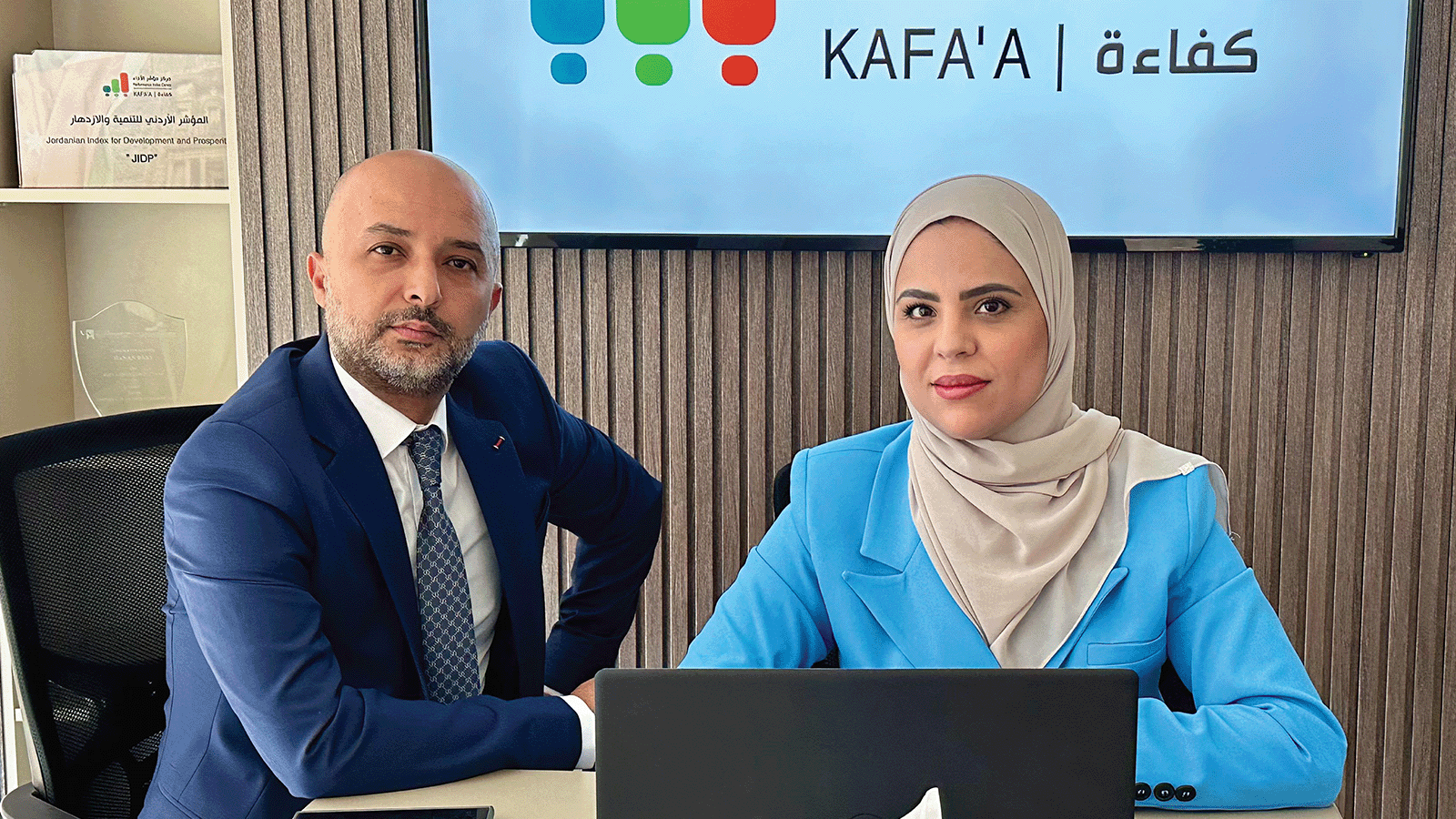
In 2020, Hanan Baki and Muath Al Mbaidheen both felt that Jordan was in need of a new NGO monitoring the government’s performance and policies.
“We wanted to be a messenger for the needs of citizens,” recalls Muath. They decided to set up the Performance and Monitoring Centre Kafa’a, a think tank which would evaluate governmental decisions and performance in a systematic way, holding authorities accountable, with a focus on democracy, gender equality and political reform.
Over the past four years, they have developed different indexes assessing development, freedom, peace and security, and entrepreneurship. Their latest policy briefs and research papers include assessments of the government’s economic policy and of student unions' elections in universities.
As a nascent organisation, the Kafa’a team knew that obtaining trust from government bodies, civil society and the general public would be a lengthy process. They knew, for example, that they would face challenges accessing data and convincing the authorities to cooperate in what is a politically charged environment. However, this year’s general elections on 10 September and growing public demand for transparency have proved to be a game changer. As Hanan puts it, they were, “a unique opportunity to establish a solid reputation through rigorous and impartial monitoring.”
Ahead of the elections, Kafa’a developed Imtithal, an index to evaluate the compliance of the Independent Election Commission (IEC) - the body responsible for administering and supervising the elections - with both national law and international democratic standards.
“With this index, we want to contribute to promoting transparent and credible electoral processes in Jordan,” says Hanan.
The Index includes 13 main indicators and 34 sub-indicators, including voter access to polling stations; confidentiality of voting; pluralism of parties and fair competition; election monitoring; campaign transparency; and result accuracy.
Their monitoring work started as soon as new parliamentary elections were announced, and the Centre delivered several interim statements and reports throughout the electoral process to ensure the IEC’s compliance. They are currently preparing a report with their findings, which they will present in press conferences and roundtables with government officials.
“One notable finding is the significant reduction in objections to the registrations of voter lists compared with previous cycles,” explains Muath. Other findings have been less encouraging, as the team has documented violations of the confidentiality of votes and attempts to influence voters’ choices.
Despite these hiccups, an opinion survey run by Kafa’a found a noticeable increase in public satisfaction with the election results and growing confidence in the political reform process in Jordan.
Looking forward, the team now plans to apply the same methodology and index to monitor future elections. They also hope to establish a model that can be used in other countries in the region and worldwide.
With EED support, Kafa’a is now training 20 university students aged 18-20 to become government performance observers and to engage with government officials, teaching them research, analytical and communications skills, with the objective to create a new generation of policy researchers.
“We chose to work with students because we want to continue working with them throughout their studies,” explains Muath, explaining that the call was advertised on social media. The final group of students come from mixed fields of interest, ranging from politics and economics to digital transformation.
If funding allows, Muath would like to hire some of them as researchers for Kafa’a once the project is concluded. “Jordan has high unemployment rates, one of our goals is to be able to offer a paid opportunity to someone.”
The students who took part in the programme are now working on a report on the state of health and education in Jordan. Many were actively involved in the election monitoring process, contributing to Kafa’a’s compliance index.
“For them it was an opportunity to both build practical skills and foster their understanding of critical issues in our country,” says Muath.
EED's funding came at an important time for the centre. “We could not achieve our objectives without some reliable financial support. Now we have a clearer view of our future,” says Hanan, noting that the finance enabled them to rent a space and to hire a team.
“Next year, we will focus on monitoring public freedoms, economic trends and women’s empowerment, exploring the barriers of access to entrepreneurship for women,” she says. “We want to tackle many important issues that people in Jordan and in the world will be interested in discussing.”
This article reflects the views of the grantees featured and does not necessarily represent the official opinion of the EED.